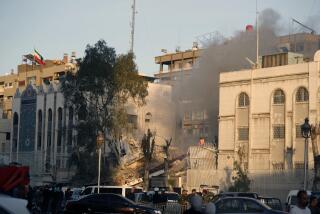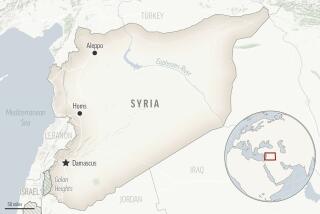U.S. military says misdirected airstrike in northern Syria killed 18 allied fighters
The U.S. military says a misdirected airstrike this week killed 18 friendly fighters battling Islamic State alongside the international coalition in northern Syria.
U.S. Central Command said Thursday that coalition aircraft were given the wrong coordinates by the Kurdish Syrian Democratic Forces for a strike intended to target militants south of their stronghold in Tabqa.
“The coalition’s deepest condolences go out to the members of the SDF and their families. The coalition is in close contact with our SDF partners who have expressed a strong desire to remain focused on the fight against ISIS despite this tragic incident,” Central Command said in a statement. “The coalition is assessing the cause of the incident and will implement appropriate safeguards to prevent similar incidents in the future.”
The Kurdish fighters, with air and ground support from the U.S.-led coalition, had surrounded Tabqa, which is on a dammed section of the Euphrates River just west of Raqqa, Islamic State’s de facto capital in Syria. But the strike on Tuesday hit their position, killing 18 of them. Several nations have contributed air power to the coalition, and it was not immediately clear which was behind the strike.
It also was not clear how many such friendly fire strikes have happened since the campaign began against Islamic State in Iraq and Syria in 2014.
The coalition releases monthly reports of civilian casualties from airstrikes, both those confirmed and under investigation. But friendly fire strikes are tracked internally, said U.S. Army Col. Joe Scrocca, a Baghdad-based spokesman for the coalition.
“The coalition takes each of these incidents very seriously but we do not keep cumulative data on them like we do civilian casualties because they happen so infrequently,” he said.
The London-based monitoring group Airwars, which works with the coalition to track airstrike casualties, has found 37 reported friendly fire strikes in Iraq and Syria since 2014.
Four had been confirmed by the coalition, including the one in Tabqa, according to Airwars director Chris Wood. The others are:
- A strike on Dec. 18, 2015, in Fallujah that killed at least nine Iraqi soldiers and injured 32 more.
- A strike on Sept. 17, 2016, in Al Tharda, Syria that killed at least 15 friendly Syrian forces.
- A strike on Oct. 5, 2016, south of Mosul that killed 18 friendly Sunni tribal fighters.
“It’s very difficult to know how many more friendly fire events there have been since the coalition does not disclose this information,” Woods said.
Scrocca said he was “not aware of those incidents; we do not keep cumulative data on them, so I cannot readily verify their validity.”
Woods said it’s difficult to track total casualties from the strikes, and their estimates vary widely.
More have been reported in Iraq, where there have been 224 to 419 suspected friendly fire casualties from coalition strikes, than in Syria, where there have been 35 to 86, he said. Woods said part of the reason the estimates vary so much is that it’s not clear who the coalition considers combatants.
From 2014 until late last year when Iraqi militias were legalized by Parliament, he said the coalition considered them civilian combatants, meaning strikes that killed them were not considered friendly fire, even though they were fighting alongside coalition forces. After the Sunni fighters were killed south of Mosul in October, the strike was initially considered “nonproblematic” until Airwars pressed the coalition to investigate. Eventually, the coalition confirmed the fighters, who were in the village of Haj Ali, had been friendly.
On a number of occasions, the coalition were convinced they were bombing Daesh forces and they were friendly,” Woods said, using a term for Islamic State. “How many more have happened? We don’t know.”
Scrocca said “tribal forces are not considered civilians and would not be part of our civilian casualty tracking, assessment and reporting process. We have been training and working with vetted tribal forces for some time, not just since the law was passed.”
Tens of thousands of Sunni and Shiite tribal fighters have joined the campaign to oust Islamic State from Mosul.
“This is terrible for morale of friendly forces on the ground,” Woods said of the airstrikes. He credited the coalition with reporting the latest incident quickly. But he also noted that of the 33 strikes with reported friendly fire casualties that have not been confirmed by the coalition, at least 13 merit further investigation.
One of the tribal fighters who was in Haj Ali recalled the horror of the airstrike.
Islamic State had attacked three hours earlier, but the fighters repelled the militants, he said. They were meeting in a house to regroup when the strike hit, said Alaa Zadan, 32, who was further back from the front line.
The next morning, Zadan went to the scene of the collapsed house to retrieve the bodies, which he recognized in the rubble.
He said 21 tribal fighters were killed, and several more wounded. Only one man survived.
“It was a disaster – for nothing,” Zadan said.
Later, the tribal fighters were contacted by Iraqi officials, who explained that the strike was a mistake. “The coalition said someone gave them the wrong location, but they won’t say who did it,” Zadan said.
After the strike, Zadan said tribal fighters worried they might be hit again.
“Airstrikes, most of the time, they’re helping us. We cannot say we don’t trust [the coalition] because they’re helping us a lot on the front lines,” he said.
But victims’ families have not been compensated by Iraqi or coalition officials. Zadan heard about the misdirected strike in Syria, and said the coalition’s announcement upset him.
“They apologized for what happened in Syria, but they never apologized for what they did to us. That upsets me,” he said.
ALSO
U.S. and Russia remain far apart on Syria after Tillerson meets with Putin and other officials
White House calls Russian denials on Syrian gas attack a ‘cover-up’
Pentagon chief warns Syria against future use of chemical weapons
UPDATES:
1 p.m.: Updates with additional comment from Scrocca, comments by witness to airstrike.
8:50 a.m.: Updates throughout with staff reporting.
This article was originally posted at 6:40 a.m.
More to Read
Start your day right
Sign up for Essential California for news, features and recommendations from the L.A. Times and beyond in your inbox six days a week.
You may occasionally receive promotional content from the Los Angeles Times.







